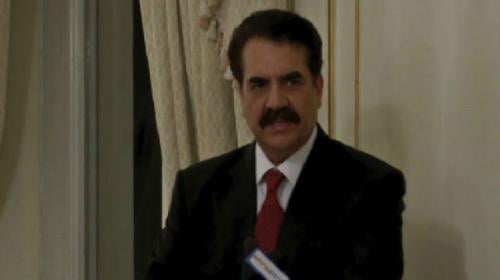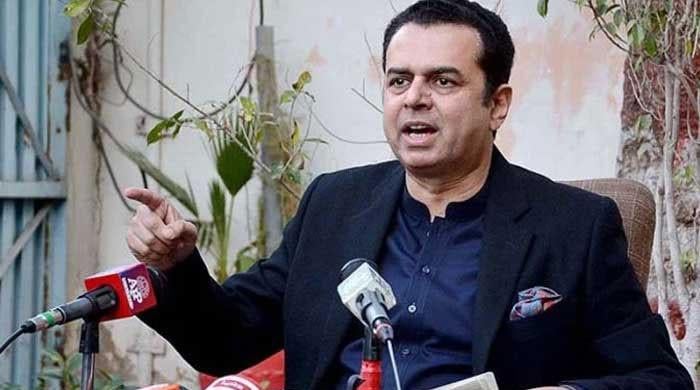Nawaz proposes four-point peace initiative with India
NEW YORK: Proposing a four-point peace initiative with India, Prime Minister Nawaz Sharif on Wednesday said the two countries should address and resolve the causes of tension and take all possible...
September 30, 2015

Speaking at the 70th session of United Nations General Assembly (UNGA), he said he wanted to use the opportunity to propose a new peace initiative with India, starting with measures that were the "simplest to implement".
“One, we propose that Pakistan and India formalise and respect the 2003 understanding for a complete ceasefire on the Line of Control in Kashmir. For this purpose, we call for UNMOGIP's expansion to monitor the observance of the ceasefire.
“Two, we propose, that Pakistan and India reaffirm that they will not resort to the use or the threat of use of force under any circumstances. This is a central element of the UN Charter.
“Three, steps be taken to demilitarise Kashmir."
“Four, agree to an unconditional mutual withdrawal from Siachen Glacier, the world's highest battleground.”
The Pakistani premier said these peace efforts will help make it possible for the two countries to agree on a broad range of measures to address the threat posed by offensive and advanced weapons systems.
The prime minister said that when he assumed the office in June 2013, for the third time, it was one of his first priorities to normalise relations with India.
“I reached out to the Indian leadership to emphasise that our common enemy was poverty and underdevelopment. Cooperation, not confrontation, should define our relationship,” he said.
“Yet today ceasefire violations along the Line of Control and the Working Boundary are intensifying, causing civilian deaths including women and children,” he added.
Warning India on interfering in Pakistan’s internal matters, Prime Minister Sharif said: “Wisdom dictates that our immediate neighbour refrains from fomenting instability in Pakistan”.
"Pakistan neither wants to, nor is it engaged in, an arms race in South Asia," he said.
"We cannot, however, remain oblivious to the evolving security dynamics and arms buildup in our region, which obliges us to take essential steps to maintain our security," he added.
"As a responsible nuclear weapon state, Pakistan will continue to support the objectives of nuclear disarmament and non-proliferation. We have maintained the highest standards of nuclear security and have established an effective regime to ensure the safety and security of our nuclear facilities and stocks.
"South Asia needs strategic stability and this requires serious dialogue to achieve nuclear restraint, conventional balance and conflict resolution."
Dialogue with India
The Pakistani premier went on to say that in 1997 when the Composite Dialogue was launched with India, the two countries agreed that this would encompass two principal items: Kashmir and Peace and Security, along with six other issues, including terrorism.
The primacy and urgency of addressing these two issues was even more compelling today, he added.
“Consultations with Kashmiris, who are an integral part of the dispute, are essential to evolving a peaceful solution.
“Since 1947, the Kashmir dispute has remained unresolved. UN Security Council resolutions have remained unimplemented. Three generations of Kashmiris have only seen broken promises and brutal oppression. Over 100,000 have died in their struggle for self-determination. This is the most persistent failure of the United Nations.”
War on terror
Speaking about counter-terror efforts of his government, PM Nawaz said Pakistan was the primary victim of terrorism and lost thousands of lives including civilians and soldiers to terrorist violence.
“The blood that has been shed – including that of our innocent children – has reinforced our resolve to eliminate this scourge from our society,” he said.
“We will fight terrorism in all its forms and manifestations, irrespective of who their sponsors are,” he added.
The premier said the Operation Zarb-e-Azb was the largest anti-terrorism campaign against terrorists anywhere, involving over 180,000 security troops of Pakistan.
“It has made substantial progress in cleansing our country of all terrorists and will conclude only when our objective has been accomplished.
This Operation is complemented by an all-inclusive National Action Plan. It encompasses police and security actions, political and legal measures and social and economic policy packages, aimed at countering violent extremism.”
‘Global threat’
He said the global threat of terrorism cannot be defeated unless its underlying causes were addressed.
“Poverty and ignorance are part of the problem. Extremist ideologies must be opposed. But the narrative of the terrorists also has to be countered through the just resolution of the several instances of oppression and injustice against Muslims in various parts of the world,” he said.
“Unfortunately, some seek to use the global campaign against terrorism to suppress the legitimate right of occupied peoples to self -determination.”
Pakistan-Afghanistan ties
Prime Minister Sharif said that Pakistan-Afghanistan relations underwent a positive transformation after the advent of the National Unity Government in Kabul.
In response to the request from the Afghan Government and with the support of the international community, Pakistan made strenuous efforts to facilitate the process of Afghan reconciliation, he said.
“Dialogue did open between the Afghan Government and the Taliban, which was an unprecedented first. But it was unfortunate that certain developments stalled the process,” said the PM.
“Thereafter, militant attacks intensified, which we unequivocally condemn. Pakistan will persist in the endeavour to help resume the dialogue process and promote peace and stability in Afghanistan,” he added.
“We can, however, do so only if we receive the required cooperation from the Afghan government.”
He said tensions between Afghanistan and Pakistan were in neither country’s interests. “We are encouraged that the international community, including the major powers, desire continuation of the peace process in Afghanistan,” he added.
PM Sharif said Pakistan greatly appreciates China’s proactive role in promoting peace and prosperity in Afghanistan and the region.
“We welcome China's vision of ‘One Belt, One Road’. The China-Pakistan Economic Corridor, announced during President Xi ainping's visit to Pakistan earlier this year will spur regional economic integration and bring prosperity to the entire region and beyond.”
PM Sharif also welcomed Russia’s greater focus on Asian cooperation.
“The Shanghai Cooperation Organization, which Pakistan will be joining this year as a full member, holds great promise for promoting regional connectivity,” he said.









